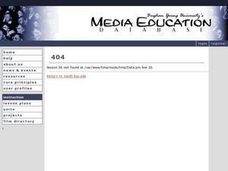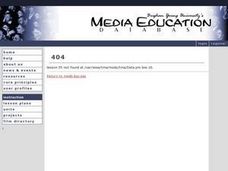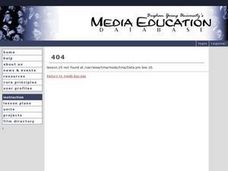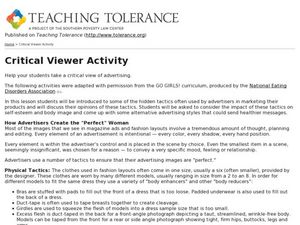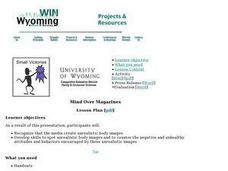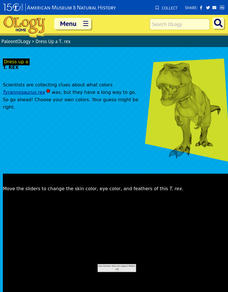Curated OER
Body and Media Introduction
Students discuss body image as a group. They discover how the media affects how one sees their body. They analyze different media messages about this topic.
Curated OER
Body and Media Reconstruction
Students use discussion and activities to create a message about body image. They discover their voice in the media and discover how the production process affects the final message from the media.
Curated OER
Gender and Media #3
High schoolers identify media messages about gender and body image. They discuss how they can change these messages. They create their own media message about gender and body image.
Curated OER
Gender and Media #2
Students are introduced to media literacy and deconstruction. They analyze the media's use of gender roles and body image. They voice their opinions about media messages and how to change them.
Curated OER
Gender and Media Introduction
Students analyze media clips and discover how the media helps us form ideas about men and women and their roles in society. They discover some of their own preconceptions about these roles and answer questions.
Curated OER
Gender and Media #1
Students expand their knowledge to not focus on stereotypes. They practice using new vocabulary words and analyze different media for the use of stereotypes.
Curated OER
Citizens and the Media / Lesson : 3 Compare and Contrast Daily Newspapers for fact, opinion and bias
Students compare and contrast a variety of daily newspapers in order to detect bias. They critically analyze the role the media plays in responsibly reporting government activities.
Media Awareness Network
Images of Learning: Elementary
Tired of 20-somethings portraying high school young scholars? Tired of athletes and principals always being the villains? Class members examine the student and teacher stereotypes presented TV shows and films that are et in schools.
Curated OER
A Media Literacy Unit on "Turn Beauty Inside Out"
Pupils become aware of the importance of distinguishing between inner and outer beauty. They explore how the media's opinion of beauty is biased and should be evaluated rather than just accepted. Each student also assesses how the...
Curated OER
Why Size Matters
Young scholars examine the concept of body image. In this current events lesson plan, students research selected websites for information about fashion models, plastic surgery, and advertising. Young scholars share and discuss their...
Curated OER
Critical Viewer Activity
Young scholars practice media awareness. In this media awareness lesson, students analyze print and electronic media messages. Young scholars discover how advertisers use re-imaging to manipulate photographs and discuss how they can...
Curated OER
Mind Over Magazines
Students watch the video "Behind Closed Doors" and discuss their reactions. They, in groups, review popular magazines and identify any unrealistic body images that are presented and then explore how these images promote a negative...
Curated OER
Finding and Authenticating Online Information on Global Development Issues
Students discover how to find authoritative resources. In this research skills lesson, students examine strategies for using the Internet effectively to research global development issues.
American Museum of Natural History
Dress up a T. Rex
Scholars play with an image's color and brightness to predict how tyrannosaurus rex's skin, feathers, and eyes would have appeared. Information and real-world pictures shed light on what evidence guides our assumption of how a dinosaur...
Nemours KidsHealth
Eating Disorders: Grades 3-5
Explore the idea of self-esteem through different mediums. Research what is needed for increased self-esteem: list three things one might do well in, take a photo of an activity where each student is performing well, and examine how the...
Curated OER
Empowered Barbie
Learners access prior knowledge of vocabulary on feminism and psychoanalytic theory, and gender schema. In this Empowered Barbie lesson plan, students recreate a Barbie doll. Learners write a reflection on how they changed Barbie's...
University of Minnesota
Mirroring Emotions
Do you ever give your class the "teacher look"? Without saying a word, they become silent and engaged (hopefully). How do they know what you're thinking? Explore the concept of nonverbal communication and how it relates to our mirror...
Curated OER
Texture: Wild Things
Young scholars experiment with different kinds of marking techniques. They read "Where the Wild Things Are" and observe animals for pattern and line. They compare illustrations with Haring's images. They create a symbolic drawing of animal.
Curated OER
Basic Visual Language Ii: How To Analyze a Visual Text
Students identify techniques used to communicate visually. They compare and contrast different visual techniques found in mass media. They apply their understanding by creating photographs that use a variety of visual literacy techniques.
Describing Egypt
Temple of Kalabsha (Temple of Mandulis)
What was the Kalabsha Temple to ancient Egyptians? Discover the importance of the dock and the use of bodies of water to the Egyptian people. The resource includes side panels with important information about the history of the location.
Curated OER
Picturing People
Young scholars look at the varied ways the human body is portrayed in contemporary media. They discuss what a character is and how it plays a role in telling stories. Students look at examples of objects like dolls, puppets and toys...
Curated OER
Reproduction, Day 2: Pregnancy
Nearly all young scholars have seen pregnant women and may have questions about human development. Intended for secondary students with mild to moderate mental disabilities, this lesson defines the process of pregnancy in a...
Global Oneness Project
Deconstructing Consumerism
To increase awareness and launch a discussion of consumerism, class members view What Would It Look Like, a 25 minute film of images that capture the global effects of the consumption of goods. Viewers make a list of the images that they...
Curated OER
Symmetrical Mummy Drawings/Mixed Media
Second graders explore Egyptian culture, including mummification, and hieroglyphic writings. They create their own mummy case using paper and a variety of materials. Students use symmetry to create their mummy.


